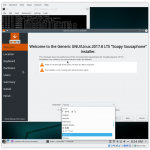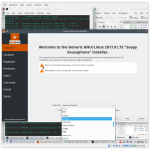Calamares on Krypton
Calamares is a Linux system installer (and some day, a FreeBSD system installer, but that is a long way off) which is distro- and desktop-independent. OpenSUSE Krypton is a live CD and installer for the latest-and-greatest .. but it already has an installer, so why try Calamares on it?
Well, sometimes it's just to show that a derivative could be made (there is one, called GeckoLinux), or to experiment with tools and configurations.
Calamares has a script called deploycala.py, which like every gaping huge security hole is expected to be downloaded from the Calamares site, then run. It is recommended to only use this in a VM, with a live CD / ISO image running. What the script does is install a basic dev environment for Calamares, install up-to-date dependencies, and then it builds and installs Calamares. That then gives you a way to experiment, installing with Calamares from an already-set-up live CD.
The deploy script supports many different package managers and host systems, so it's just a matter of running python3 deploycala.py -n to get started (and then wait for a while as packages are installed, Calamares is cloned, and then built). Calamares builds with no issues on Krypton (at least today, when I tried it).
Having built Calamares, there's a few bits I notice:
- Esperanto isn't supported in Qt applications (neither in Krypton, nor in Manjaro, nor in anything else I tested); QLocale has a constructor that takes an enum value specifying the language, but for a bunch of languages in that enum, it then creates a "C" locale. This is documented with the wriggly description "... if found in the database ...", but is rather unsatisfying.
- Manjaro (Qt 5.10) does a better job of displaying Indic scripts than OpenSUSE Krypton (Qt 5.11), although this might be an artifact of installing updated packages into the live system.
- The keyboard-layout picker displays no keycaps. It also doesn't provide any useful debugging output. This is probably a combination of missing packages in the live system, and Calamares not providing enough useful feedback when the live image isn't quite right. The latter, I can fix.
So, by briefly switching distro's today, I've found one bug of my own, and one configuration thing for myself to document. And then from this not-using-Calamares distro, I can move on to another one.

